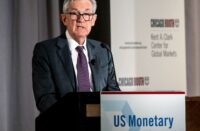Unicredit’s CEO, Andrea Orcel, is in the midst of two potential takeovers – one involving Italy’s Banco BPM and the other with Germany’s Commerzbank. Despite political unrest delaying the deal with Commerzbank, analysts suggest Orcel has room to enhance his bid for Banco BPM.
Orcel is no stranger to large-scale banking deals, having been a key player in the controversial 2007 takeover and subsequent split of Dutch bank ABN Amro. His interest in Commerzbank was made public in September when Unicredit announced a surprise stake in the bank, which until recently was speculated to merge with Germany’s largest lender, Deutsche Bank.
Unicredit has also offered 10 billion euros ($10.5 billion) for Banco BPM. This offer was described as being on “unusual terms” by the Italian bank, as it did not reflect its profitability and growth potential. This move was not well-received by the Italian government, with the Economy Minister warning against engaging on two fronts.
Despite the pushback, analysts believe Unicredit, which has seen its CET1 ratio (an indicator of financial strength and resilience) remain above 16% for the first three quarters of this year, can still improve its domestic bid. While there is limited room for enhancement, a more than 10% increase could dilute shareholder earnings.
Unicredit initially proposed an all-stock deal that would merge two of Italy’s largest lenders, with each share valued at 6.657 euros. Analysts suggest Unicredit could make the offer more appealing by adding a cash component. This is Orcel’s second attempt to acquire Banco BPM and it is unlikely there will be a third. Therefore, a cash component could be a decisive factor in closing the deal.
The merger and acquisition (M&A) landscape in Italy was set for activity last month after Banco BPM acquired a 5% stake in Monte dei Paschi, the world’s oldest bank. UniCredit’s offer puts Banco BPM in a difficult position as it triggers a passivity rule, preventing it from taking any action that could impede the bid without shareholder approval.
In an environment of easing interest rates, a consolidation offensive could be Unicredit’s best defense. Both takeover prospects hedge some exposure. A Commerzbank merger could create synergies in capital markets and more, while Banco BPM offers complementary strength in asset management.
Despite the potential benefits of these takeovers, analysts caution against high integration costs and a drain on management time if Unicredit tries to absorb both targets. They suggest that Unicredit, which has seen consistent growth and a significant hike in its share price, can choose to stand alone if the deals do not generate returns for shareholders.




